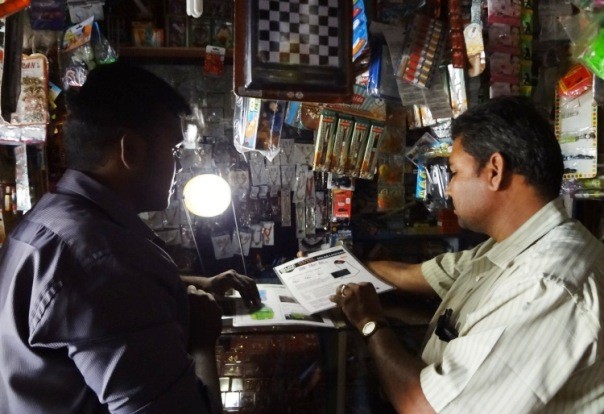Source: Thomson Reuters Foundation – Fri, 11 Apr 2014
By Nita Bhalla

Mumbai , India, April 11 (Thomson Reuters Foundation)
A start-up Indian social enterprise has come up with an innovative solution to one of the country’s biggest development challenges – helping the rural poor easily access basics such as clean drinking water and electricity.
Essmart Global is bringing affordable products such as solar lanterns, rechargeable batteries and water filters to the doorsteps of mud-and-brick villages through a unique partnership with shopkeepers in south India.
“We bring different technologies that are appropriate to rural areas to existing market places such as rural ‘kiranas” or ‘mom-and-pop stores’, and make these products available through a catalogue,” said Prashanth Venkataramana, Essmart’s head of operations in India.
“Customers will have access to the products they want and get them delivered within a day, without having to travel to the cities and towns where these products are generally only available.”
Venkataramana was speaking on the sidelines of the Sankalp Unconvention Summit in Mumbai, where hundreds of social enterprises from around the world have gathered to showcase their ideas for development.
The three-day conference has seen social entrepreneurs pitching products such as solar lanterns, clean cooking stoves, and irrigation tools which use less water or agriculture instruments which make processing crops more efficient.
India has witnessed stellar economic growth over the last two decades, yet one third of the country’s 1.2 billion population still lives below the poverty line.
Seventy million households – 35-40 percent of the country’s 1.2 billion people – have no access to electricity, while 100 million do not have access to clean drinking water.
But while there are thousands of products which can help address these issues, most are not easily available to the rural poor – largely because village retailers cannot afford to buy in bulk, a key requirement for manufacturers.
GOING THE LAST MILE
Essmart Global, in essence, acts as a distributor and buys products in bulk, which are stored in local warehouses. When a customer orders a product from the catalogue in his village store, it is dispatched and delivered to the shop the next day.
“We provide any product which can improve the quality of life of people living in rural areas. These are products such as solar lanterns, water filters, tablet computers, rechargeable batteries and rechargeable flashlights,” he told Thomson Reuters Foundation.
“There are also products which can help them in their occupations such as agricultural equipment, little gadgets that can work on their farms or fields.”
The social enterprise, which began operations in August 2012, provides 45 products to 400 village stores in the west of Tamil Nadu state and works with around 20 large and small manufacturers.
The company has sold some 2,200 products so far, with the most popular being solar lanterns which sell for around 1,400 rupees ($23).
For more expensive products, such as a solar-powered water pumps for irrigation, Essmart helps customers arrange a line of credit with the manufacturer or through a microfinance company. All products come with a warranty.
Venkataramana said one of the most exciting outcomes is not just that the business helps rural customers, but that it also benefits villager retailers.
“These rural shops generally only sell fast-moving consumer goods such as shampoos, soaps, toothpaste etc which they make little (profit) on,” he said.
“What we are getting the shopkeeper to do is sell technology products which he wouldn’t normally sell and helping him increase his margins. In fact, stores which have worked with us, have seen a 30 percent increase in their monthly income by selling products from Essmart.”
source: http://www.trust.org / Thomson Reuters Foundation / by Nita Bhalla / Friday, April 11th, 2014